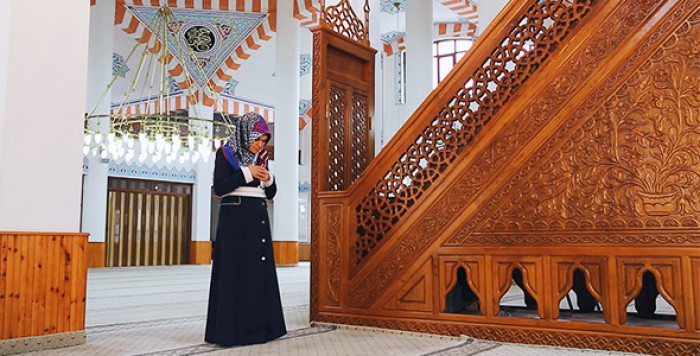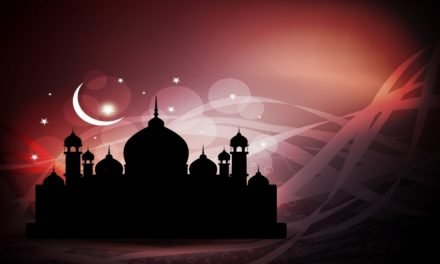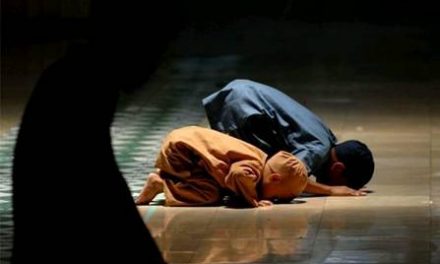
In the first part, Dr. Jasser Auda raised the question about where women prayer area should be located within the mosque and whether segregating women from men in mosques is acceptable. He listed 5 disadvantages of this practice and showed how the design of the Prophet’s Mosque was open for both males and females. In this article, an important advantage of such an open design is discussed.
Women Learnt from Imam directly
As women had their share in the Prophet’s Mosque, they were able to see him as he preached. That is scientifically proven to help in maintaining attentiveness and proper communication. Some women used to directly learn the Quran from the recitation of the Prophet (peace and blessings be upon him).
Um Hisham Bint al-Harith ibn Al-Nu`man said:
I memorized Surat Qaf only from the mouth of the Messenger of Allah (peace and blessings be upon him); he would recite it in his speech every Friday.[1]
Abdullah ibn `Abbas narrated,
Umu-l-Fadl heard me reciting “Wal Mursalati `Urfa” (Quran, Chapter 77). She commented, “O my son! By Allah, your recitation made me remember that it was the last Surah I heard from Allah’s Messenger (peace and blessings be upon him). He recited it in the Maghrib prayer. “[2]
Um Salamah, the wife of Allah’s Messenger (peace and blessings be upon him) said,
I used to hear people making a mention of the Cistern (hawdh), but I did not hear about it from Allah’s Messenger. One day while a girl was combing me I heard Allah’s Messenger say: “O people.”
I said to that girl: Keep away from me.
She said: He (the Prophet) has addressed men only; he did not call women.
I said: I am amongst the people (called by him).
Allah’s Messenger (peace and blessings be upon him) said:
I shall be your harbinger on the Cistern; therefore, be cautious lest one of you should come (to me) and may be driven away like a stray camel. I would ask the reasons, and it would be said to me: You don’t know what innovations they made after you. So I would also say: Be away.[3]
Narrated Abu `Uthman:
I was informed that Gabriel came to the Prophet (peace and blessings be upon him) while Um Salamah was with him. He started talking (to the Prophet). Then the Prophet asked Um Salamah, “Who is this?” She replied, “He is Dihya (Al-Kalbi).”
When Gabriel had left, Um Salama said, “By Allah, I did not take him for anybody other than him (i.e. Dihyah) till I heard the sermon of the Prophet wherein he informed about the news of Gabriel.”[4]
It was narrated from Asma’ bint Abu Bakr that she said:
The sun eclipsed during the lifetime of the Prophet (peace and blessings be upon him) … then, I came and entered the Mosque, and saw the Messenger of Allah (peace and blessings be upon him) standing up (in prayer).
I joined him in prayer, and he kept standing up so long that I felt I needed to sit down. Yet, I would notice a weak woman standing next to me, so I would say, “She is weaker than me” and I would keep standing.
Then he (peace and blessings be upon him) bowed down for ruku` and kept bowing for long, and then he raised his head from ruku` and kept standing up for so long that had a man approached then, he would have thought that the Prophet (peace and blessings be upon him) had not yet offered the ruku`.[5]
Hence, there is no need to isolate women within walls or curtains or to prevent them from sighting the Imam. It is proven that women used to see the Prophet (peace and blessings be upon him) in the Mosque, and that it had a positive impact on their acquisition of knowledge. They also benefited from, and were even quite careful to observe, attendance at the Mosque.
Drawing lines on the ground or using low barriers may be sufficient for organizing the areas of prayer for men and women to avoid any undesired dispute or crowding.
References:
[1] Muslim’s Sahih, the chapter on Friday, 3/13.
[2] Al-Bukhari’s Sahih, the chapter on Adhan 2/388, Muslim’s Sahih, The Prayer Chapter 2/40.
[3] Muslim’s Sahih, The Virtues Chapter 4/1795 .
[4] Al-Bukhari’s Sahih, The Merits 7/244. Muslim’s Sahih, Companions’ Merits, 7/144
[5] Muslim’s Sahih, chapter on eclipse, 3/32.






